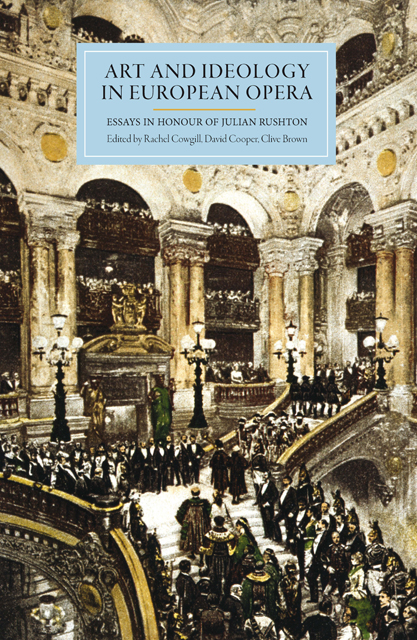Book contents
- Frontmatter
- Contents
- List of Figures
- List of Music Examples
- List of Tables
- Notes on Editors and Contributors
- Acknowledgements
- Introduction
- I Nationalism, Cosmopolitanism and National Opera
- II Opera, Class and the Politics of Enlightenment
- III Opera and Otherness
- Julian Rushton: A Family Memoir
- 7 The Works of Julian Rushton
- Index
- Tabula Gratulatoria
7 - The Sadler’s Wells Dialogues of Charles Dibdin
Published online by Cambridge University Press: 28 February 2023
- Frontmatter
- Contents
- List of Figures
- List of Music Examples
- List of Tables
- Notes on Editors and Contributors
- Acknowledgements
- Introduction
- I Nationalism, Cosmopolitanism and National Opera
- II Opera, Class and the Politics of Enlightenment
- III Opera and Otherness
- Julian Rushton: A Family Memoir
- 7 The Works of Julian Rushton
- Index
- Tabula Gratulatoria
Summary
Italian opera in late eighteenth-century England has been the subject of much research in recent years, though little work has been done on responses to it by English theatre composers. A case in point is the series of innovative short operatic works that Charles Dibdin wrote during the 1770s for the theatre at Sadler's Wells near Islington, then a summer resort outside London. This paper has three main aims, apart from the obvious one of drawing attention to some delightful and unfamiliar eighteenth-century operatic works – a project dear to Julian Rushton's heart. First, to explore Dibdin's career at Sadler's Wells and the role his dialogues played in the varied entertainments put on there. Second, to reassess Dibdin's music in the context of the English reception of the galant style in the 1770s. He was limited as a composer, though he was the first Englishman who could handle the galant cliches with assurance, and could apply them effectively to comic situations. As such, he deserves more attention than he has received from modern scholars; Daniel Heartz gave him only a dismissive aside in his recent large-scale survey of the galant style. Third, to place Dibdin's dialogues in the context of recurring English attempts to come to terms with Italian opera. I argue that they were modelled on the Italian intermezzi and burlettas produced at the time in London, such as Pergolesi's La serva padrona. However, Dibdin (who seems to have written most of his own libretti) replaced the Italian commedia dell’arte settings and characters with realistic, modern vignettes of English working-class life, nearly always without the interplay between masters and servants that is the mainstay of most comedy of the period. To audiences that would have associated all-sung opera with gods, goddesses, shepherds and nymphs, they must have seemed as disturbingly or delightfully modern as Jerry Springer, the Opera seems to us.
Dibdin at Sadler's Wells
Dibdin came to London from his native Southampton in 1759 at the age of fourteen. He initially supported himself by tuning harpsichords and playing the organ in London churches, though he was soon advised to try his luck on the stage.
- Type
- Chapter
- Information
- Art and Ideology in European OperaEssays in Honour of Julian Rushton, pp. 148 - 175Publisher: Boydell & BrewerPrint publication year: 2010



